One of the things people have the most trouble with is wiring multiple subs or dual voice coil subs to an amp. This post will explain what series and parallel wiring is, a little bit on Ohm’s law, the difference between single and dual voice coil subs, and how to wire subs to different Ohm loads with subwoofer wiring diagrams.
If you just want to get to wiring and don’t care about the technical stuff, click here to be brought to the subwoofer wiring diagrams page.
How to Wire Subs: Series and Parallel Wiring
Series
Series wiring for speakers means you are connecting the speakers like a chain. The positive terminal from one speaker connects to the negative terminal of the next speaker, then the positive of that speaker connects to the negative of the next speaker. You can do this with an infinite number of speakers. In this arrangement, if one part of the circuit is removed, nothing will work.
Series wiring will add the impedance of each speaker together, so for example: if you had three 2 Ohm speakers wired in series, the total impedance would be 6 Ohms. This will be explained in greater detail when I get to Ohm’s law.
For series wiring: Total Impedance = Sub Impedance x Total # of Subs
Parallel
Parallel wiring connects all of the positive terminals together and all of the negative terminals together. This means if part of the circuit goes out, all of the rest will still be connected, but the impedance will be affected.
Parallel wiring of speakers reduces the resistance seen by the amp, therefore making the amp work harder by pulling more current. Instead of adding all of the impedances together, the total impedance will be reduced further and further with each speaker added to the circuit. For example: if you wire (2) 4 Ohm subs together in parallel, you will get a total load of 2 Ohms.
For parallel wiring: Total Impedance = Sub Impedance / Total # of Subs, so if you have (4) 2 Ω SVC subs all wired in parallel, the total impedance will be 2 Ω / 4 subs = 0.5 Ω
Ohm’s Law
Ohm’s law is the governing equation for all electrical circuits, and the equation is V = I x R where V=voltage, I=current, and R=resistance.
Voltage is constant for car audio (12V nominal, 14.4V with a running vehicle).
Resistance is constant (the total impedance your speakers are wired to).
Current will change depending on your impedance and the power your amp is capable of.
Rearrange the equation to read I = V / R.
This shows that if resistance is decreased, then the current the amp is pulling will increase. Therefore, the power output of the amplifier will increase because of the power equation P = V x I. Now you see why wiring subs to lower impedances will get more power out of your amp, and as a result and is why a lot of amps don’t like seeing too low of an Ohm load. A low ohm load will try to overpower the amp by pulling too much current.
This is a great Ohm’s Law chart to quickly see all the equations for power, current, voltage, and resistance:
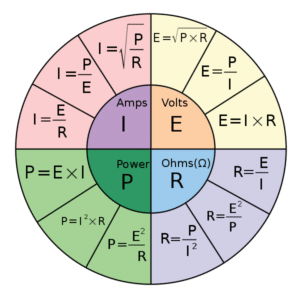
Single vs. Dual Voice Coil
The number of voice coils a subwoofer has determines your wiring options. Many people think DVC subs are more powerful than SVC or vice versa, but this is not the case. They make so many different versions of the same subs so you can get the total Ohm load you need no matter how many subs you plan on connecting together. A single DVC sub has two different wiring options right out of the box, whereas a SVC sub only has one.
Single Voice Coil (SVC)
Single voice coil subs are subwoofers that only have one voice coil. The impedance of a SVC sub will only be what that sub is rated at. For example, a single SVC 2 Ohm sub can only be wired to 2 Ohms.
Dual Voice Coil (DVC)
Dual voice coil subs have two voice coils. A single DVC sub can be wired to two different Ohm loads right out of the box by wiring it in either series or parallel. For example: a single 4 Ohm DVC sub can be wired to either 2 Ohms (parallel) or 8 Ohms (series). The Ohm rating on DVC subs is actually the rating per voice coil, so you cannot wire a 4 Ohm DVC sub to 4 Ohms.
How to Wire Subs to Desired Impedance
Now that you know what series wiring will raise total impedance and parallel will drop total impedance, I will show you how this is used in subwoofer wiring. Whenever you have (2) SVC subs of the same impedance, series wiring will always double that number, and parallel wiring will always half that number. Some math is needed for all other cases, especially when wiring multiple DVC subs together since you can have a mixture of series and parallel wiring in the same circuit.
For example: this circuit of two DVC 2 Ohm subs wired to a total load of 2 Ohms at the amp has the voice coils of each sub wired in series, but the two subs are then wired to each other in parallel. Wiring a DVC 2 Ohm sub in series gives you 4 Ohms. Then wiring two 4 Ohm subs in parallel will give you 2 Ohms. Hopefully that makes since.
Double check your final impedance with a multimeter after wiring before connecting your subs to the amp. I personally use this one from Amazon and it has worked great for me.

Below are some more diagrams for the most common wiring configurations. Post a comment or send an email if you don’t see the configuration you plan on wiring, and I can help you out. Here is a link to just the wiring diagrams for easier access: http://caraudioadvice.com/subwoofer-wiring-diagrams/
Subwoofer Wiring Diagrams – How to Wire Subs:
Single Voice Coil
[one_half]
Two 2 Ω subs wired in series to 4 Ω
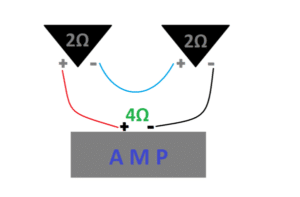
Two 4 Ω subs wired in series to 8 Ω
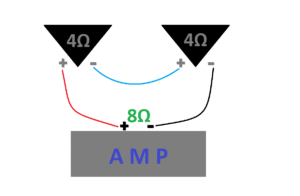
[/one_half]
[one_half_last]
Two 2 Ω subs wired in parallel to 1 Ω
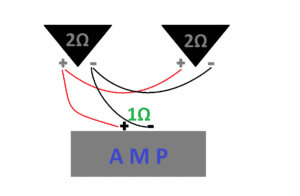
Two 4 Ω subs wired in parallel to 2 Ω
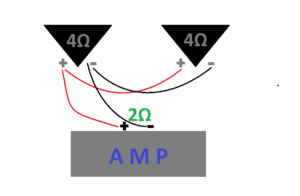
[/one_half_last]
Dual Voice Coil
[one_half]
One DVC 2 Ω sub wired in series to 4 Ω
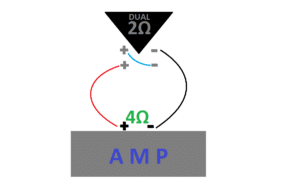
One DVC 4 Ω sub wired in series to 8 Ω
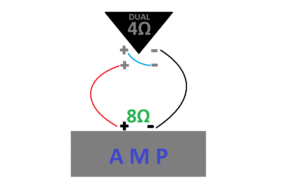
Two DVC 2 Ω subs wired to 0.5 Ω
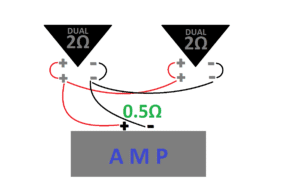
Two DVC 4 Ω subs wired to 1 Ω
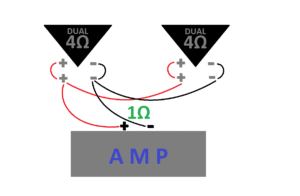
[/one_half]
[one_half_last]
One DVC 2 Ω sub wired in parallel to 1 Ω
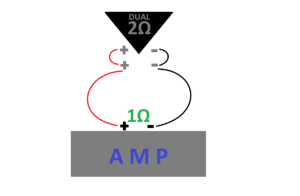
One DVC 4 Ω sub wired in parallel to 2 Ω
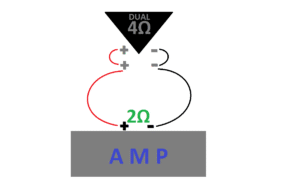
Two DVC 2 Ω subs wired to 2 Ω
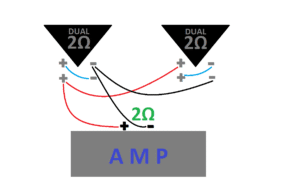
Two DVC 4 Ω subs wired to 4 Ω
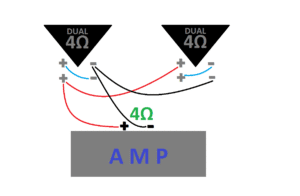
[/one_half_last]
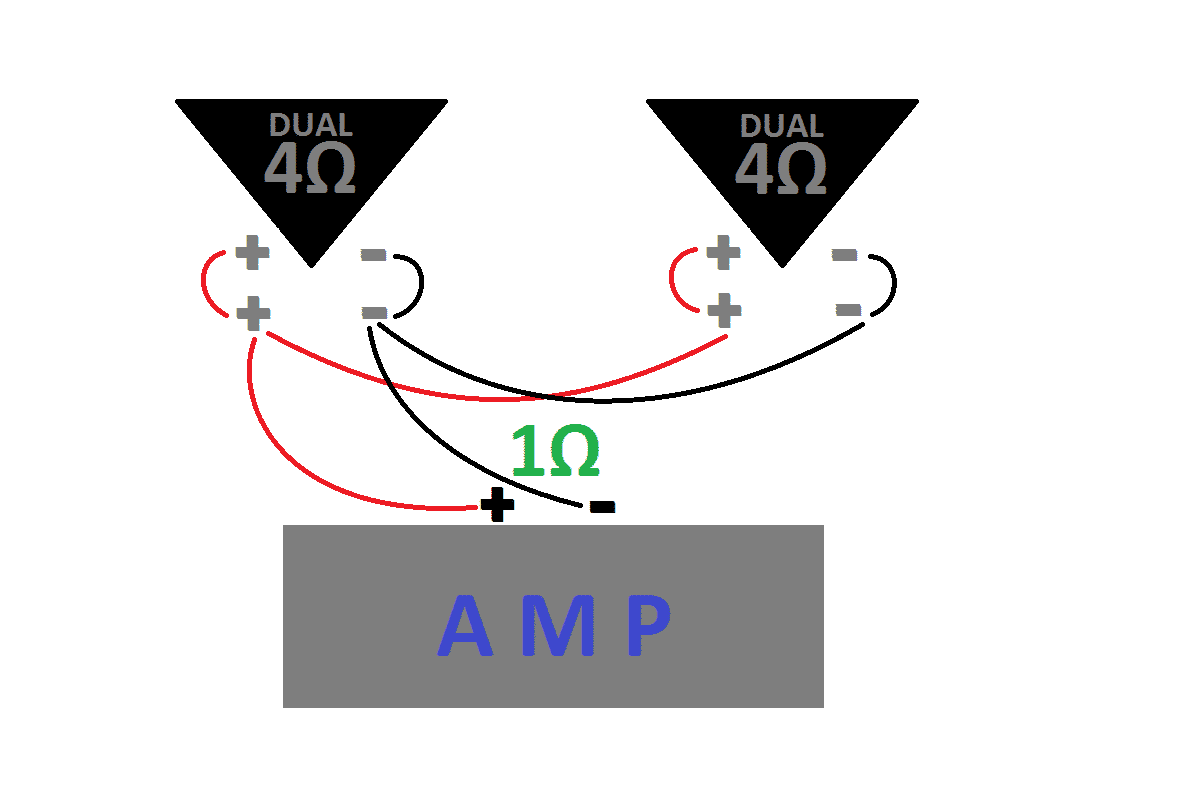
How would you wire 4 DVC 2OHMS to 2 1800.1 amps?
Do you know if the amps are strappable? If so, then it would be best to strap them together and wire all 4 subs up that way. If that’s the case let me know and I can draw up a diagram of how to do it.
If you plan on running one amp per 2 subs, then you would wire each amp up using this diagram: https://i0.wp.com/caraudioadvice.com/wp-content/uploads/2017/01/2-dvc-2ohm-subs-wired-to-2ohm-e1485224862191.png
Or for more power if your amp is 0.5 Ohm stable (most aren’t), you can wire them like this: https://i1.wp.com/caraudioadvice.com/wp-content/uploads/2017/01/2-dvc-2ohm-subs-wired-to-0.5ohm-e1485224835206.png
Hi. I just bought 2 4 Ohm DVC Pyle subs and own an old Kenwood KAC-920 amplifier, it´s not brigdeable. How would I connect these 2 DVC subs to 1 amp (not brigded)?
Sorry to take so long to get back to you. Have you found your answer yet? I saw on a forum that “left + , right – is the age old way to bridge”. If it isn’t bridgeable, I wouldn’t use it for subs. Does it say it is not bridgeable? Or just doesn’t say how to?
When wiring 2 2ohm subs to 2 ohms would one sub be out of phase?
I’m assuming you mean DVC subs? Because you can’t wire two 2 ohm SVC subs to 2 ohms. It is possible to wire them out of phase, but if you follow the diagram above they will be in phase
I have two 4 ohm single coil in a box and I have one 4 ohm dual coil in another box and I can’t get them in phase the two 4 ohm single coils in the box are ran parallel and the one 4 ohm in the other box only has one voice coil hooked up right now can you help? Lol
Edit: you can run just one coil on the dvc sub, but it cuts the power handling in half.
For this setup to work properly, you would need to make sure each sub is the exact same. Wiring up just one voice coil of a dual 4 ohm sub is not recommended and could possibly damage the sub. I would try to find a third sub is the same as the other 2 4 ohm SVC subs. Also, make sure the box volume is the same for each sub.
Can you wire 2 x 2ohm dvc subs to get a 4ohm load at the amplifier
No because each DVC 2 ohm sub can be wired to 1 (parallel) or 4 ohms (series). So 2 1 ohm loads can be wired to 0.5 ohms (parallel) or 2 ohms (series). 2 4 ohm loads can be wired to either 2 ohms (parallel) or 8 ohms (series). So your choices are either 0.5, 1, 2, or 8. Most monoblock amps are usually 2 ohm stable. It can almost definitely handle an 8 ohm load, but you won’t get as much power out of it. Some mono amps can handle a 1 ohm load, but very are 0.5 ohm stable.
I came across something I didn’t know before, but apparently you can use just one voice coil of a dvc sub. So in your case, you could run these 2 subs together at 4 ohms but since you would have to use only one voice coil on each sub, it will cut the power handling in half.
For this situation, I still recommend wiring to a final 2 ohm load as long as your amp is stable at 2 ohms
Can you wire one 4ohm svc to one 4ohm dvc on an amp? And if so would it be best to run them both at 2ohms parallel????? Or in a series for 8ohms to get the most out of my 2800 watt amp.
Sorry, I just saw your comment. I wouldn’t recommend mixing different impedance subs like that. The dvc 4 ohm sub can either be wired to 2 ohms or 8 ohms, so if you wire that together with a 4 ohm svc sub, one will be getting more power than the other.
You could also just use one could of the 4 ohm dvc sub to get a final 2 or 8 ohm load, but it will cut your power handling in half.
Wiring to 2 ohms will get more power out of your amp if it’s 2 ohm stable. Wiring to 8 ohms won’t get as much power from the amp, but the amount won’t have to work as hard and will run cooler
Can I wire 1 4ohm svc sub in one box and 1 4ohm dvc in a separate box from one amp? If so how would you suggest wiring?
Edited: sorry, misread the question before.
I wouldn’t recommend running one svc and one dvc sub together. The wiring will send more power to one sub. You could use just one coil of the dvc sub and wire the 2 together to either 2 or 8 ohms but since you would only be using one coil, it will cut the power handling in half
I have 2 alpine 10″ 4ohm subs and jl jx 1000/d amp so I can’t get those subs to run 2ohm to my amp?
If they are svc 4 ohm subs, then yes. Wire them parallel and it will give you 2 ohms. If they are dvc 4 ohm subs, I would recommend wiring to 4 ohms
Rockford p3 2 ohm sub has dual 2 ohm vc. Would like to wire this single sub to 2 ohm final
Unfortunately the only way to wire that sub to 2 ohm would to be only hook up one voice coil which cuts the power handling in half. I would wire it in series to 4 ohms total. This way your amp will be happier
I have 2 .Dual 2 ohm subs rms 1000 2000 max and a 2 channel 2600 amp can’t seem to figure the best way to hook it up I also have a 2000 watt max mono amp do u think u can give me some advice on which way to go one sub one amp two subs one amp then which amp .I bought single box ported and a dual box sealed I just want it to be done correct it ant cheap
What brand and model subs and amp do you have?
2 sound stream t5 12 and I over bought a plant audio 2600.2 and a boss 2000.m I jump the gun on buying should read ur site first just to bang so if I need to buy some thing else pls recommended .not rich but I need my beat thank you
Dual 2 ohm subs can be wired together to 0.5, 2, or 8 ohm (each sub can be wired to 1 or 4 ohm). The 2 channel Planet Audio amp is only stable down to 4 ohm, so if you go with that one, I’d wire the subs to 8 ohms. If you do the Boss amp, it can handle 2 ohms. You’ll probably be around the same power either way. The Planet Audio is a little better amp, but they are both known for over rating their power. You could always try it both ways and see what you like best. Just don’t run the Planet Audio below 4 ohm or the Boss below 2 ohm, or you’ll damage the amps.
Thanks. I guess ur right the only way is to do it and see what sound good do u know what amp would go better with what I got to get its full power thank you
I have 2 Rockford fosgate p3d2 12s. Powered by Rockford fosgate p1000x1bd amp. Can I wire them individually to the 1 ohm load and then connect both sets of + & – to the amp to get a 1 ohm load or would it be 2 ohms? The amp is 1 ohm stable I just don’t want to burn anything up, but want to get the most out of them but the amp isn’t .5 ohm stable.
I have 2 Rockford fosgate p3d2s with a Rockford fosgate p1000x1bd amp that’s 1 ohm stable. I k omw you can wire 1 of these speakers down to 1 ohm, but can you wire the coils the same way individually nd connect to the amp to get 1 ohm or would it be .5, or 2?
Each sub can be wired to either 1 or 4 ohm, so together, they can be wired to 0.5, 2, or 8 ohms. I would wire it to 2 ohms total at the amp in this case to be safe.
Could you please help me? My dilemma: I have an audiobahn ultra excursion subwoofer. 2000w peak, 1000w RMS. Its a dual DVC 2ohm sub, which means it has 4 connection points (4+ &4-) so 8 in total. It’s also 1-4ohm stable. My question is what are all the different wiring options I have for this monster and how would I go about doing them. Could someone please help me out with the diagrams? Much appreciated in advanced!
Looks to me like it’s a normal DVC sub. The extra connection points can be confusing, but they just provide more flexibly on wiring so you don’t have to run a bunch of wires around the sub like most normal connections. I found this diagram that should help you out. Each pair of + and – are the same thing, so you won’t need to use every single port.
https://www.manualslib.com/manual/394135/Audiobahn-1-Sub-Wiring-Diagram.html
I have two 12″ pioneer premier 4 ohm dvc subs I wanted to hook to my kicker zr600. I wired it series/parallel to get a 4ohm bridged state. I was left with a left + and a right – The amp has writing on it stating bridged mode is right + left – the terminals go + – + – (didn’t notice that till I went to hook them to the terminals) Can I just hook them to the appropriate terminals for bridging or will that be bad for the wire scheme? I’m thinking that’s not good but I don’t really know. If I can’t do that what’s the best way to hook them up if I can even do it with these subs. The amp is rated for 2ohm or 4ohm stereo and 4,2,1.33,and 1 ohm bridged.TIA
Sounds like you got it. Don’t worry about the wires coming from the subs being left positive or negative or right positive or negative. As long as you have them wired right, you’ll have a positive lead and a negative lead coming from them. Just hook those up to the amp where it marks bridged input. Positive and negative won’t really matter. It’s actually common to swap the polarity on subs to see if you like how it sounds better. Hook it up and listen then swap positive and negative and listen again to see which sounds better.
How do I hook up a dual voice coil 2000 watt MAXP154D single sub with 4 POS and 4 neg (2 sets on each side) to an amp
I couldn’t find much information on that sub, but it says dual 4 ohm. My guess would be they just include an extra set of terminals for easier wiring. Check and see if the 2 positives on one side are connected together. Same with the negatives.
I got Kicker 1200 watt mono class D amp with 1200 watt 2 ohm stable kicker 10 inch. With a bass control, the bass is not separating from the the radio like the alpine amp I had had previous, it doesn’t even sound as good as I was hoping, bass is weak Any suggestions ?
I would recommend setting the gains properly on the new amp. See this post for how to do that: http://caraudioadvice.com/how-to-install-and-tune-an-amp-with-wiring-diagram/
I want to wire a 2ohm 12 inch kicker and a 4 ohm 10 inch kicker to a 2/4ohm amp is this do able ?!
Sorry for the late response. You could do that if you wanted to see how it sounded, but one sub will be getting more power than the other and may sound odd. Just don’t wire them in parallel to 1.33 ohms. Wire them in series to 6 ohms. If the amp is only stable down to 2 ohms, wiring it lower could damage it.
Can I hook up two 1 old svc to a dvc2 olm with a .5 stable amp
It’s not recommended to mix impedances like that. It’ll cause some weird issues with one sub getting more power than the others. Best to get all matching subs if you’re running them on one amp
I was wondering if I can run 3 2ohm subs in parallel on a 1ohm amp
(3) 2 ohm subs wired in parallel would result in 0.67 ohms. I wouldn’t recommend it as it could damage the amp.
Hi. I am struggling. I have 2 fosgate t1s1 10s. 1 ohm. Do i have to run these in series and bring them to 2ohm for them to work. Is there a way to keep them at 1 ohm. Running fosgate t1000 bd amp
Yes, you would need to run them in series at 2 ohms since they are single voice coil subs. The only other way to wire them would be 0.5 ohm, but the amp probably wouldn’t be very happy with that.
How do I hook up a12″ dual voice coil 2 ohm and a 12″ dual voice coil 4 ohm together?
I wouldn’t recommend doing that. It will send more power to one sub than the other. It’s best to try to trade one or get another that matches.
Kicker cvrs
(2) 4ohm DVC L7s powered by 2800w db amp. top of the line at the time. says its stable to .5ohm. I should be good to wire them down to 1ohm right? Not that I could with those current speakers, but I don’t think I’d want to push it at .5ohm. Its 2 channel, I’d still want to bridge it correct?
Yeah, if it’s stable to 0.5 ohm, you’re fine running it at 1 ohm. I haven’t heard of many 2 channel amps that are 1 ohm or 0.5 ohm stable, though. What amp is it? It may be a monoblock with 2 sets of inputs. Just makes wiring easier, but not 2 channels.
you are correct. sorry. lol. its a DB drive 2800 monoblock. I bought it like 6-7 yrs ago and had it all hooked up, sounded great but the car it was in blew the motor and I haven’t hooked it back up since. well,…its that time. lol.
I just hadn’t looked at it in a while. only 1 set of inputs.
Correction yet again. It IS 2 channel. Its a DB drive okur and pro2800 class ab. It IS bridgeable. If I bridge it, won’t that cut my ohms as well? And should I even do that?
Ah ok. Looking at their website, it looks like it’s only stable down to 4 ohms bridged, so you could try wiring your subs to 8 ohm and bridging. I wouldn’t run subs stereo though. You’ll have too much cancellation if they share the same airspace. You’ll get close to the same power to them either way: (1) 4 ohm sub on each channel in stereo or (2) subs wired to 8 ohms and the amp bridged. You could try both ways, but I would recommend bridging.
Its 440w at 4ohm and 880w @ 2ohm, and, im mistaken once again, its 1 ohm stable. according to the specs in the manual.
I’ve got 2 12 L7s DVC in seperate compact sealed enclosures. I’m way more focused on quality than quantity. Should I still run then bridged? Bridging does reduce clarity correct? I was thinking running them all parallel in stereo, with a dip, is cancelation still goingnto be an issue? Sorry to hit you with a million questions for every one you’ve answered, I do appreciate the help!
Oh their website must not have all the info on it then. It said 1800W at 4 ohm bridged which usually means it’s only 4 ohm stable since they didn’t have other ratings. I forgot you said dvc. So yeah I’d run them bridged at 4 ohms. Make sure you set the gains properly though. I think those subs are rated 750w each.
A4*
I have 2 rockford fosgate r2d4 12 inch subs. I have a jl audio e1200 monoblock full range amp as well as a pioneer 1000 amp model gm/a5702. My head input is factory so I’m also running an loc. What would be the best wiring for this system?
With (2) 4 ohm DVC subs, you can either wire them to 1 ohm or 4 ohms. That JL amp only puts out 120W at 4 ohms. The Pioneer amp puts out 480W bridged at 4 ohms. Those subs are rated 250W rms, so I’d recommend going with the Pionner amp bridged. That’s just about perfect for 2 of those subs. Depending on what car you have, check out the AudioControl LC2i LOC (https://amzn.to/36o3TqE) especially if you have a car that cuts bass frequencies at higher volumes.
i have 2 10″ 4 ohm svc subs and an crunch PX1000.2 amp that is bridgeable to 1000w x1 at 4 ohms, can i parallel connect my subs to this amp.
No, it looks like that amp is only 4 ohm stable bridged, so you run the risk of damaging it wiring the subs to 2 ohm. I would wire them in series to 8 ohm. The amp won’t put out as much power that way, but it’ll be safe.
If I wire a 1 ohm sub in series with a smaller 4 ohm sub (In order to not fry my 4ohm stable amp) Which sub will sound louder? The 1 ohm or the 4 ohm?
It’s not recommended to do that because of the sound difference, but it will most likely be whichever sub is more efficient will be the one that sounds louder. But there’s a lot that comes into play like frequency response and TS parameters.
Please help. Have 2 dvc 4 ohm hifonics trying to wire to a 6800 watt 4 channel monoblock amp. How can I wire them correctly and for best bass results???
I’m not sure what you mean by a 4 channel monoblock. Monoblocks are single channel amps, but I assume it’s a monoblock and not a 4 channel if it’s rated at 6800 watts. Some monoblocks will have multiple wiring outputs, but they are wired internally and still a single channel. This just makes it easier for wiring up.
If the amp is stable at 1 ohm, you could wire the subs together to 1 ohm. If it’s not 1 ohm stable, I would wire them to 4 ohm.
I’ve got a 5 channel amp 4 channels@4ohm 50w RMS going to door speakers and then the sub channel @4ohm 300w RMS. I’ve got 2 dual voice coil subs @4 ohm rated at 150w RMS each how would I go about wiring the subs up and would this be enough power to run them both?
The sub channel on that amp is perfect for those subs. You can either wire each sub in series to 8 ohms then wire them together in parallel for a total of 4 ohm. You could also wire each sub to 2 ohm then wire them together in series for a total of 4 ohms. The first option will probably make wiring easier outside of the box. See here for wiring diagrams: https://caraudioadvice.com/subwoofer-wiring-diagrams/
I have 2 Sony xplod xs-L121P5W 1 kicker 43cvr124 and 1 kicker s12L5 with a power acoustic rzr1-2500d ….. all going in a Toyota four runner… best setup for my hookup??
It’s not recommended to mix subwoofers like that. Your best option is probably to sell the 2 you don’t want and get 2 others to match the one you keep.
Hello…. quick question… if I’m wiring up 1 dvc 2ohm sub in parallel would you bridge it at the amp or wire it to one channel?… thanks for your time
Oh and amp is 1 ohm stable
If the amp is 1 ohm stable, sounds like it’s a monoblock, so there isn’t a way to bridge it. Some monoblocks have 2 output pairs to connect to, but they are the same channel. It just makes it easier to wire up, so just use one positive and one negative if that’s the case. If it’s a 2 channel amp, bridge 2 channels together for the sub, but I doubt that’s the case as I haven’t seen many amps that are 1 ohm stable bridged.
Ok…it’s a skar 1200.1D 1ohm stable 2 ch 1200 rms power @ 1 ohm
That’s a monoblock amp, so just a single channel. It looks like 2 channels because of the 4 different speaker wire outputs, but both positives and both negatives are tied together internally. So you just need to use one of the positive outputs and one of the negatives. They just do that to make it easier when wiring in multiple subs
Ok cool thank you very much…… not questioning your knowledge by any means but why would they sell it as a 2 channel? I’m just curious I’m trying to learn most of the in and the outs
That I’m not sure. Where did you buy it? Skar’s website shows the 1200.1D as 1 channel. Usually the “.1” part will tell you how many channels, so if it was a2 channel 1200 watt class D amp, it would probably be called “1200.2D”.
I bought it from skar audio… and you are right it’s a monoblock…..
I messed up ….I was Telling you what my wife has Is in her truck, my amp is different it’s the skv2 -1500.1d so still a single channel…. but I do thank you for all of your help and time… thank you
Ah ok. No problem
I have a JL Audio 12 W6V2 that is dual voice coil and 2 8 inch single voice coil Subs is it possible 2Wire all three to a monoblock amp at 2 ohms
I wouldn’t recommend mixing different subs like that on one amp since the power won’t be distributed equally.
I just bought a subwoofer. I’m currently in the process of building the box for it and looking for the right amplifier. But my question here is, if my 15 inch 2ohm DVC subwoofer with 1400 watts rms @ 2ohms is wired to a 4 ohm load, would the rms wattage drop down to 700 watts or would it drop down to 1050 watts? I know that it will lose power I just dont remember how much! And since I’m already on the topic, how much more power would my sub make if I wired it with a 1 ohm load? I need to know all of this so I can decide on the right amplifier for whatever wiring option I finally decide on
Sorry for the late response. If the sub has a rating of 1400 watts, that’s it rating no matter how it is wired. Since it’s a 2 ohm DVC sub, it can be wired to either 4 or 1 ohm. It’s going to be more expensive to get an amp that can do 1400 watts at 4 ohm than it is to get an amp that can do 1400 watts at 1 ohm. So the easiest, cheapest option is to find an amp that is rated around 1400 watts rms at 1 ohm and go with that.
It’s not the sub that will make more power, but the amp. An amp rated at 1400 watts at 1 ohm will probably do around 350 watts at 4 ohms. An amp that’s rated 1400 watts at 4 ohm will probably do close to 5600 watts at 1 ohm. Just make sure the amp is actually rated at 1 ohm if you go that route.
How do i wire 2 4 ohms dvc and 1 4 ohm svc to 1 ohm amp
It’s not recommended to mix subs with different impedances. I would run either the 2 4ohm dvc together on the amp at 1 ohm or just the single 4 ohm for now and sell the other(s) and buy another matching one if you want to use more than 2
I have a strange situation. I had 2 ZVX 15’s with 1 ohm DVC and an SKV3500 amp. Everything is great wired down to 1 ohm load at the amp. I loved it so much I bought anther 2 zvx15’s and another skv3500. Now the problem is I have 4 sub with 1 ohm DVC and that cant be wired down to 1 ohm. How do I get a 1 ohm load to each amp and keep everything same power in phase. I saw I could wire 1 voice coil of each sub to one amp and the other voice coil to the other amp. However I don’t know what the ohm load would be or how to connect them. This is the video i saw https://www.youtube.com/watch?v=koCqdDXTb3s
Sorry for the late response. Just saw your comment.
Are all 4 subs in the same box? If they are in separate boxes, the issue he talks about in the video won’t be as much of a problem.
I was going to say to strap the amps, but saw the part of the video where he did that with his amps and they weren’t playing the same. Even then, strapping the amps would be the easiest method. And you could give it a shot to see how it sounds.
But after watching the whole video, that’s a really interesting method. Thanks for sharing. It may come in handy one day.
As far as wiring goes for his method, I’ll try my best to explain it. He used 4 ohm DVC subs which made it a little easier. If you wire it how he showed, each amp would see 0.25 ohms and not be happy.
So each sub has 2 voice coils. Lets call them VC1 and VC2. And call the amps amp1 and amp2. And subs s1, s2, s3, s4.
Wire VC1+ on s1 to VC1- on s2, then run a wire from there to amp1+.
Wire VC1- on s1 to VC1+ on s2, then run a wire from there to amp1-.
Repeat this for s3 and s4.
Then repeat all of that again for amp2.
Hopefully that makes sense, but still use a multimeter to see what the final ohm load would be at each amp.
I’ll draw a picture later when I have time and send you an email.
Then just go through the video’s method of gain and phase matching.
Run them parallel , both positive together and negative together, be 2ohm load.
For two 4 ohm subs or a dual 4 ohm sub, yes
Is there a difference between wiring DVC subs up in impedance then running two subs in parallel bringing it back down. As opposed to wiring each sub down then running two subs in series bringing the load back up? The assumption is that the same subs are used in either case. The resistance on the amp remains the same, but will the sequence each is wired in change the performance of the subs?
Nope won’t matter. Usually it’s nicer looking wiring wise to wire the individual subs each in series, then wire the two subs together in parallel to the amp.